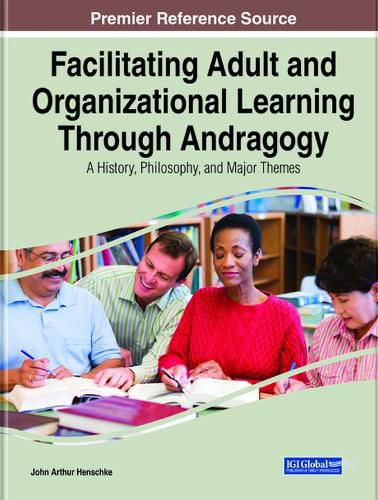Readings Newsletter
Become a Readings Member to make your shopping experience even easier.
Sign in or sign up for free!
You’re not far away from qualifying for FREE standard shipping within Australia
You’ve qualified for FREE standard shipping within Australia
The cart is loading…






This title is printed to order. This book may have been self-published. If so, we cannot guarantee the quality of the content. In the main most books will have gone through the editing process however some may not. We therefore suggest that you be aware of this before ordering this book. If in doubt check either the author or publisher’s details as we are unable to accept any returns unless they are faulty. Please contact us if you have any questions.
Andragogy may be defined as a scientific discipline for study of the research, theory, processes, technology, practice, and anything else of value and benefit including learning, teaching, instructing, guiding, leading, and modeling/exemplifying a way of life that would help to facilitate and bring adults to their full degree of humaneness. Andragogy is one part of the broader international field of adult education, human resource development, and lifelong learning, thus serving the advancement and connection needs of adult learners, organizational development, and lifelong learning in areas such as higher education, business, military, corporate training, healthcare, executive leadership, courtroom practice, religious life, and human resource development.
Facilitating Adult and Organizational Learning Through Andragogy: A History, Philosophy, and Major Themes investigates the history, philosophy, and major themes of andragogy and how they may contribute to helping practitioners to design and facilitate adult and organizational learning. The book presents more than 500 documents that are examined through two different lenses. The first lens is the history and philosophy (or a chronological approach) of andragogy while the second lens takes a look at the major themes as categories of what the documents express. While encompassing the background, uses, and future of andragogy, this book is ideally intended for teachers, administrators, practitioners, stakeholders, researchers, academicians, and students.
$9.00 standard shipping within Australia
FREE standard shipping within Australia for orders over $100.00
Express & International shipping calculated at checkout
This title is printed to order. This book may have been self-published. If so, we cannot guarantee the quality of the content. In the main most books will have gone through the editing process however some may not. We therefore suggest that you be aware of this before ordering this book. If in doubt check either the author or publisher’s details as we are unable to accept any returns unless they are faulty. Please contact us if you have any questions.
Andragogy may be defined as a scientific discipline for study of the research, theory, processes, technology, practice, and anything else of value and benefit including learning, teaching, instructing, guiding, leading, and modeling/exemplifying a way of life that would help to facilitate and bring adults to their full degree of humaneness. Andragogy is one part of the broader international field of adult education, human resource development, and lifelong learning, thus serving the advancement and connection needs of adult learners, organizational development, and lifelong learning in areas such as higher education, business, military, corporate training, healthcare, executive leadership, courtroom practice, religious life, and human resource development.
Facilitating Adult and Organizational Learning Through Andragogy: A History, Philosophy, and Major Themes investigates the history, philosophy, and major themes of andragogy and how they may contribute to helping practitioners to design and facilitate adult and organizational learning. The book presents more than 500 documents that are examined through two different lenses. The first lens is the history and philosophy (or a chronological approach) of andragogy while the second lens takes a look at the major themes as categories of what the documents express. While encompassing the background, uses, and future of andragogy, this book is ideally intended for teachers, administrators, practitioners, stakeholders, researchers, academicians, and students.